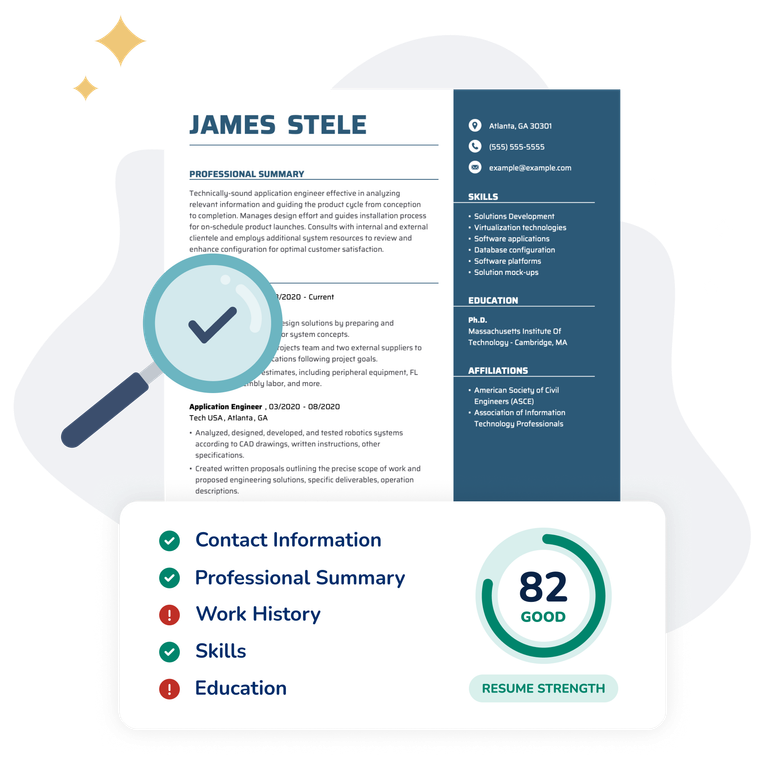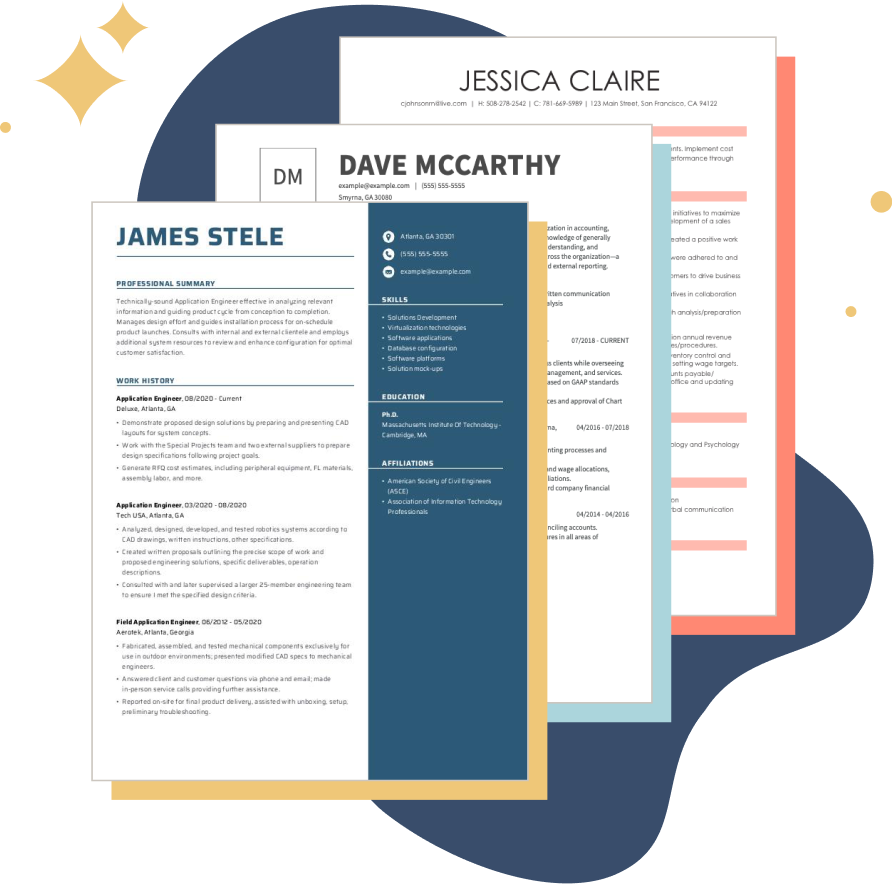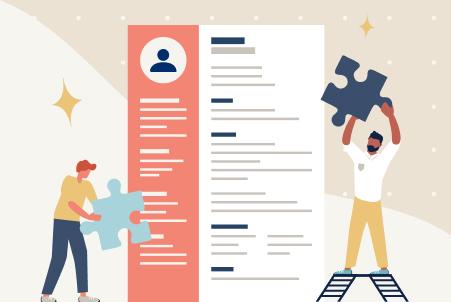Our customers have been hired at: *Foot Note
Table of Contents
Get started with MyPerfectResume today!
- Build a resume on any device
- Pick an ATS-friendly template
- Tailor with AI copy suggestions
The job interview process can seem grueling, but it doesn’t have to be. With the right preparation, attitude, and knowledge, you can feel confident and ready for any job interview that comes your way.
Our comprehensive job interview guide will provide the advice and examples you need to maximize your chances of making a strong first impression and landing the job.
How to Prepare for a Job Interview
A job interview is your opportunity to showcase your skills, experience, and personality to potential employers. Preparation is key for impressing hiring managers and standing out.
Research the company
It is important to have a good understanding of the company you are applying to before the interview. This includes their mission, values, products or services, and any recent news or developments.
You can find this information on the company's website, social media platforms, and news articles.
This will not only show that you are genuinely interested in the company, but it will also help you tailor your answers to align with their values and goals.
Review the job description
Read the job description carefully to understand the key responsibilities and qualifications required for the role.
This will help you anticipate the type of questions that may be asked and prepare tailored answers accordingly.
Explore interview training tools designed to help you prepare for industry-specific interview questions.
Consider your relevant experience
Study your resume thoroughly and think about highlights from your past employers. Write down specific achievements that pertain to the job you’re interviewing for and align them to the job requirements and company culture.
Practice common interview questions
It is always a good idea to practice answering common interview questions beforehand. This will help you feel more confident and prepared during the actual interview.
Based on your research and the job description, prepare specific examples and anecdotes that showcase your job-relevant skills and experience. This will help you give thoughtful and detailed answers during the interview.
Prepare questions for the interviewer
Asking questions shows your interest and engagement in the position and allows you to gather more information about the company and the role.
Some great interview questions could include questions about the company culture and the specific responsibilities and expectations of the role.
Preparing for Different Job Interview Formats
You might be familiar with phone, video, and in-person job interviews, but did you know there are more formats? Let’s examine some of the most common ones, along with strategies for acing them.
Phone interviews
This type of job interview is conducted over the phone and is usually the first step in the hiring process. It allows the interviewer to screen candidates before inviting them for an in-person interview.
Strategies for a successful phone interview:
- Find a quiet and distraction-free place to take the call.
- Have a copy of your resume and job description in front of you for reference.
- Demonstrate your communication skills by speaking clearly and confidently.
- Use a friendly and professional tone.
- Avoid rambling and keep your answers concise.
Video interviews
The video interview format is a type of job interview in which the interviewer and the interviewee interact through a video call instead of meeting in person.
Sometimes, a video interview might be a step before a face-to-face interview.
Video interviews have increased in popularity in recent years due to advancements in technology and the rise of remote work.
Strategies for a successful video interview:
- Prepare and practice beforehand, including researching the company and potential questions.
- The setup is important for a video interview. Create a professional and well-lit background.
- Test your technology and internet connection beforehand.
- Dress professionally as you would for an in-person interview.
- Maintain eye contact by looking directly into the camera of your desktop or mobile device.
- Minimize distractions and background noise.
Traditional face-to-face interviews
This is the most common interview format, in which you meet one-on-one in person with one or more interviewers from the same or different departments and levels.
It usually takes place in a formal setting, such as an office or conference room.
Strategies for a successful face-to-face interview:
- Research the company and the position beforehand to gain a better understanding of what they are looking for.
- Dress professionally and arrive on time.
- Make eye contact and maintain confident body language.
- Listen carefully and answer questions concisely.
- Be prepared to talk about your strengths, weaknesses, and relevant experiences.
Panel interviews
This format involves a group of three or more interviewers asking you questions simultaneously. The panel may consist of individuals from different departments or levels within the company.
Strategies for a successful panel interview:
- Research the backgrounds of the panel members to understand their roles and potential questions they may ask.
- Greet each panel member individually and make eye contact with each of them periodically during the interview.
- Address each panel member by name when responding to their questions.
- Speak clearly and confidently. Be concise and avoid rambling.
You might be asked for multiple rounds of interviews. Use our guide on rounds of interviews to get through each one with confidence and poise.
Behavioral interviews
This job interview format focuses on your past experiences and behaviors to assess your potential for success in the role you are interviewing for.
Strategies for a successful behavioral interview:
- Research common behavioral interview questions and write down specific examples from your past experiences that demonstrate your relevant skills and abilities.
- When structuring your answers, use the STAR method (Situation, Task, Action, Result) to ensure you respond clearly, accurately, and concisely.
- Review the job description to identify the key competencies the potential employer wants and tailor your examples accordingly.
- Be specific about your achievements and provide concrete details, such as numbers, to support your answers.
- Review recent RTO trends and learn how to showcase varied skills, including in-office collaboration and remote work.
Competency-based interviews
In this format, interviewers will ask you questions about specific skills or behaviors required for the job.
These skills will depend on the job and industry and might include teamwork, communication, leadership, problem-solving, adaptability, and time management. Prepare for leadership interview questions and behavioral interview questions.
The interviewer will ask you to provide concrete examples of how you have demonstrated these competencies in previous roles.
Strategies for a successful competency-based interview:
- Research the job requirements thoroughly and match your skills to what they're after. Prepare specific examples from different areas of your life, such as work, school, or volunteer experiences, that demonstrate your competencies.
- Use news articles, the company website, and social media profiles to understand the company's values and culture and how you fit in.
- Use the STAR method to structure your responses and highlight your job-relevant strengths and experiences.
Case interviews
Case interviews are commonly used in consulting and business-related roles. In this format, the interviewer presents a business problem or scenario and asks you to analyze it and provide solutions.
Your interviewer will expect you to ask clarifying questions and explain your thought process while developing a solution.
They will also look for your analytical and problem-solving skills, as well as your ability to think critically and creatively on the spot.
Strategies for a successful case interview:
- Practice solving case studies beforehand to get familiar with the format and build confidence.
- Take your time to understand the problem, ask clarifying questions, and think out loud as you work through the case.
- Communicate your thought process clearly and logically to the interviewer. Stay calm, organized, and focused.
- Be open to different solutions and be ready to adapt if the interviewer challenges your approach.
Presentation interviews
In a presentation job interview, potential employers will ask you to prepare and present on a specific topic related to the job.
This format is often used for roles that require strong communication and presentation skills. A Q&A session with the interviewer usually follows the presentation.
If you're applying for a leadership position, prepare your answers for manager interview questions that assess your communication and management style.
Strategies for a successful presentation interview:
- Thoroughly research the topic and the company, and tailor your presentation accordingly.
- Use visual aids, such as slides or handouts, to make your presentation more engaging.
- Practice your presentation with friends or family and ask for their feedback.
- Mind your body language, tone, and pace. Maintain eye contact and use a confident and engaging tone.
- Dress professionally and adopt an engaging yet professional demeanor.
- Prepare for possible questions and practice answering them before the job interview.
- Bring notes for answering questions.
Tips for a Successful Interview
- Dress professionally: Dress appropriately for the interview. This shows that you take the interview seriously and are professional. If you are unsure about the dress code, it is better to be overdressed than underdressed.
- Practice good body language: During in-person or video interviews, maintain good eye contact, sit up straight, and use appropriate hand gestures. This will convey confidence and professionalism.
- Look your interviewer in the eyes: Looking your interviewer in the eyes is crucial for building rapport with them. It also shows confidence and professionalism, demonstrates active listening, and conveys honesty.
- Stay calm and positive: On the day of the interview, try to stay calm and positive. Take deep breaths and remind yourself of your qualifications and preparation. A positive attitude can convey confidence and make a good impression on the interviewer.
- Follow up after the interview: Remember to write a follow-up email after your interview to thank the interviewer for their time and express your continued interest in the role. Send your thank-you email within 24 hours of your interview.
Common Interview Questions (With Sample Answers)
To help you get ready for your upcoming job interview, we've compiled a list of the top interview questions with example answers for each one.
“Tell me about yourself”
This question allows hiring managers to hear your professional story in your own words and gain insights into your job qualifications and personality.
Hiring managers often assess your verbal communication skills and self-confidence when they ask this question.
To answer this interview question, briefly introduce yourself and what brings you to the interview. Then, provide a brief overview of your professional work history, your key academic or job accomplishments, and the skills you have that make you a great candidate for the position.
A great way to distinguish yourself from other candidates is to mention job-relevant hobbies and interests that show your personality and add depth to your job qualifications.
Most importantly, finish your response with a question for the interviewer about the position or the company. This will show the interviewer that you are interested and engaged in the conversation.
Here’s an example answer for this question:
“What are your greatest strengths?”
Hiring managers are likely to ask this interview question to better understand your relevant abilities and skills, particularly if they use skills-based hiring practices.
This question reveals your hard skills and soft skills and your level of confidence, enthusiasm, and motivation.
Use storytelling techniques to briefly tell the hiring manager how you have used your strengths to make a positive impact on previous employers.
Here’s an example answer:
“What are your greatest weaknesses?”
Hiring managers might ask this question in a job interview to gain insight into your self-awareness, honesty, and capacity for self-improvement.
In your response, emphasize that you have been working on improving the weakness and highlight your positive attributes.
Here’s an effective sample answer:
“Why should we hire you?”
Hiring managers ask the question “Why should we hire you?” in interviews to gain insight into your goals, self-perception, and qualifications.
By asking this question, hiring managers can evaluate your strengths and weaknesses, determine if you are a good fit for the job, and gauge your enthusiasm for the role.
Here’s an example answer:
“Why do you want to work here?”
Hiring managers often ask this interview question to understand what attracted you to the company, your motivations, and your level of commitment to the job.
They want to know if you are truly passionate about the position and the company, and this question helps them see if you know and fit the company’s values and culture.
Here’s an example of a good answer to this job interview question:
“What are your salary expectations?”
This interview question is usually asked early in the interview process, often during phone screen job interviews. Potential employers ask about salary expectations to determine whether your expectations match the salary range for the position.
Before the interview, research the typical salary range for the role, factoring in your location, industry, skills, and level of experience. Rather than answering with a single figure, offer a range that reflects your market value while demonstrating that you are open to discussion.
If you are still learning about the role or are unsure of the budget, you can request more information before providing your answer.
For example, “Before discussing my salary expectations, I’d love to learn more about the responsibilities and overall benefits package for this position. Could you share the range budgeted for this role?”
This approach allows you to gather more information and keeps the door open for conversation later on in the interview.
Here is a sample answer if you have a specific range in mind:
“What is your greatest professional achievement?”
Hiring managers might ask this job interview question to get a better understanding of your skills, motivation, problem-solving abilities, and communication skills, which are all important factors in determining their fit for the job.
To answer this interview question confidently, share an example of an accomplishment that relates closely to the job. Be specific and use details to illuminate your reply.
Here’s an example of how a sales manager might answer this question in an interview:
“Tell me about a time when you overcame a challenge.”
There are several reasons why potential employers might ask this question in a job interview. They might want to assess your problem-solving skills and get a sense of your resilience and adaptability, or they could be looking for potential red flags.
For example, if you have trouble answering this question, it might mean that you don’t have concrete experience overcoming challenges in the workplace or lack problem-solving skills.
Think back to a time when you had to overcome something at work. Be specific and explain in detail the steps you took to overcome the challenge. Wrap it up by highlighting the positive impact you made from overcoming it.
Here is an example answer:
“How do you handle stress and pressure?”
Stress and pressure are inevitable in any job, and the hiring manager wants to understand how well you deal with them. This question helps the manager gauge your resilience, coping mechanisms, problem-solving skills, and ability to perform under pressure.
A great way to answer this question might be:
“What kind of work environment do you prefer?”
Hiring managers ask this interview question to gain insight into your personality, working style, and potential cultural fit within the company. It also allows them to make a more informed decision when selecting the best candidate for the job.
Prepare to answer this question by thoroughly researching the company and the team dynamic, and tailor your answer to your findings.
Here’s an example of how a graphic designer might answer this question:
Are you looking for work-from-home jobs? Our sister company, FlexJobs, updates listings daily with verified full-time and part-time remote jobs.
Questions To Ask In a Job Interview
During a job interview, the hiring manager will ask you various questions to get an in-depth understanding of your qualifications, experience, and fit for the position. They will likely also expect you to be prepared with questions for them.
Asking thoughtful and relevant questions in an interview demonstrates your interest in the company and the role and lets you gather important information about the job and the company culture.
"What are the top priorities in the first few months for this position?"
This question helps you better understand the role's expectations and responsibilities. It also shows the interviewer that you are proactive and eager to contribute to the company's success from day one.
"Can you tell me more about the company culture?"
Ask this interview question to assess whether you will fit in with the company's values and working style. It also gives the interviewer the opportunity to highlight the company's values and what they look for in their employees.
"How does the company support and invest in employee development and growth?"
This question shows that you want to advance your skills and career within the company. It also gives you an idea of the opportunities available for professional development and advancement within the company.
"Can you walk me through the company's goals and how this role contributes to them?"
This job interview question shows that you are interested in the bigger picture and how your role fits into the company's overall objectives. It also gives you an idea of the company's priorities and what they are looking to achieve in the near future.
This knowledge can help you tailor your answers and highlight your skills and experiences that align with the company's goals.
"How do you measure success in this role?"
Knowing how success is measured for the role gives you a clear understanding of what will be expected of you and how your performance will be evaluated. It also helps you set realistic goals and expectations for yourself.
"Can you walk me through the typical day-to-day responsibilities of this position?"
Ask this interview question to gauge the day-to-day tasks and responsibilities of the job, and get a better idea of what the role entails and if it is a good fit for you. Doing so shows the manager you’re serious about the position.
"How does this role fit into the overall goals of the company?"
Understanding how the role fits into the company's overall goals demonstrates your interest in the bigger picture and how your work will contribute to the company's success.
"What are the biggest challenges facing the company/department/team currently?"
Knowing the specific challenges facing the company or team helps you see if you have the skills and experience to handle them and if you are up for the task.
This interview question also gives hiring managers the chance to elaborate on their expectations for the role.
"Can you provide more information about the career growth and development opportunities within the company?"
Asking about career growth and development opportunities conveys your interest in long-term growth within the company and displays serious interest in the job. It also allows hiring managers to discuss potential advancement opportunities in depth.
"Can you tell me about a recent project or achievement the team has accomplished?"
This is an excellent interview question to ask a hiring manager because it gives you an idea of how you could use your skills to make an impact if you were hired.
Key Takeaways
- Prepare for a job interview by researching the company, the position, and the interviewer; be prepared to discuss your resume.
- Prepare for common interview questions and use the STAR method to structure your responses when applicable.
- Emphasize accomplishments that align with the role, and present yourself with confidence and professionalism.
- Ask insightful questions that demonstrate genuine interest in the organization and the opportunity.
- Conclude the interview on a positive note and send a courteous thank-you email to express your appreciation and continued interest.
FAQ
What should I wear to a job interview?
The key is to dress professionally, comfortably, and in a way that aligns with the company culture. Remember, your appearance reflects your professionalism and can affect the interviewer’s perception of you.
For more traditional industries like finance, law, or consulting, formal business attire is expected. This typically means a suit and tie for men or a professional dress, suit, or pantsuit for women. Everything should be well-fitted, clean, and polished.
If you’re interviewing for a position in a business casual environment — common in fields like tech, education, or marketing — you can opt for dress pants or a skirt paired with a button-down shirt, blouse, or a smart sweater.
For virtual interviews, dress professionally from at least the waist up. Not only does it show respect for the process, but dressing the part can help you feel more focused and confident.
When in doubt, it’s always safer to be slightly overdressed than too casual. A neat, professional appearance creates a strong first impression and shows that you take the opportunity seriously.
How early should I arrive for a job interview?
We recommend that you arrive at least 10-15 minutes early for a job interview. This will give you enough time to check in, gather your thoughts, and prepare yourself before the interview.
Arriving early also shows that you are punctual and responsible, which are important qualities for any job.
However, it is important not to arrive too early as it may inconvenience the interviewer or give the impression that you are overly anxious. It is best to plan your arrival time carefully and aim to be at the location a few minutes before the scheduled interview time.
What kind of questions should I expect during a job interview?
During a job interview, you can expect various questions that will help the interviewer get to know you and evaluate your qualifications for the position.
These questions may range from general inquiries about your work experience and skills to more specific questions about your previous job responsibilities and how you handle certain situations.
It is also common to be asked behavioral or situational questions that require you to provide examples of how you have handled past situations or solved problems.
What should I avoid in a job interview?
In a job interview, it is important to avoid certain behaviors or actions that may negatively impact your chances of getting the job.
- Avoid being late or arriving unprepared for the interview. This can give the impression that you are not responsible or don’t take the opportunity seriously.
- Don’t talk negatively about previous employers or experiences, as this can poorly reflect your character and attitude.
- Avoid being overly casual or informal in your language and behavior, as this may be unprofessional.
- Don’t ask about salary or benefits too early in the interview process, as this can give the impression that you are only interested in the job for financial gain.
To be fully prepared for a job interview, remember to bring a printed copy of your resume and cover letter, a notepad and pen, a portfolio with work samples (if applicable), and any requested identification or paperwork.
What types of questions should I ask the hiring manager?
The best interview questions demonstrate your interest in the company and the role while also allowing you to gain a deeper understanding of the organization’s expectations and culture.
Some examples of effective questions to ask include inquiring about the company’s goals and priorities, asking about the team’s management style and communication methods, and seeking clarification on the responsibilities and challenges of the position.
Additionally, asking about the company’s growth opportunities and future plans can show your long-term interest in the role.
What are some steps you should take to prepare for an interview in advance?
Here are some of the best ways to prepare for an interview:
- Research the company: Learn about the company’s mission, values, services or products, recent news, and culture. Understand their goals and how your role would contribute to them.
- Understand the role: Review the job description closely. Identify the key responsibilities and qualifications, and think about how your background aligns with them.
- Review your resume and experience: Be ready to talk about your past roles, achievements, and challenges. Know your resume well and prepare to elaborate on anything you’ve listed.
- Practice common interview questions: Prepare answers to questions like “Tell me about yourself,” “What are your strengths and weaknesses?” and “Why do you want to work here?” Use the STAR method to structure your responses for behavioral questions.
- Prepare questions to ask the interviewer: Brainstorm thoughtful questions about the team, role, company culture, or next steps. This shows your interest and engagement.
- Do a tech check (for virtual interviews): Test your internet connection, camera, microphone, and the interview platform (Zoom, Teams, etc.) in advance.
Whether in person or remote, how you carry yourself matters. Maintain good posture, eye contact, and speak clearly and confidently. You can also plan your outfit the night before so you’re not rushed the day of the interview.
How long should you prepare for an interview?
How long you should prepare for an interview depends on the role and how much time you have before the interview, but a good rule of thumb is to spend at least a few hours spread over a couple of days. Here’s a rough breakdown of how to use that time effectively:
- One to two hours researching the company, including its mission, values, products, recent news, and culture. Understand what they do and how the role fits in.
- One to two hours reviewing the job description and mapping your experience to what they’re looking for. Think of examples using the STAR method (Situation, Task, Action, Result) to prepare for behavioral questions.
- One hour practicing common interview questions out loud, especially your “Tell me about yourself” and “Why do you want this role?” answers.
- About 30-45 minutes preparing thoughtful questions to ask the interviewer.
- Optional extra time doing a mock interview with a friend, mentor, or career coach, or reviewing technical materials if the role is technical.
If you have more time (a week or more), it’s great to space your prep out and revisit key parts for better retention and confidence. But even with just a day or two of focused, intentional prep can make a big difference.
How we reviewed this article
Since 2012, we have helped more than 11 million job seekers. We want to make your career journey accessible and manageable through our services and Career Center’s how-to guides and tips. In our commitment to bring you a transparent process, we present our Editorial Process.
Our customers have been hired at:*Foot Note










